Peace Escapes Once Again
In what is at present Due south Sudan, families have been fleeing conflict for generations, repeating a tragic wheel that began nearly lx years ago. The get-go Sudanese civil war dragged on from 1955 to 1972. The second raged even longer – from 1983 until the 2005 peace deal that led to South Sudan'southward independence in 2011.
But the respite was brusque-lived. In the past year, fresh conflict between supporters of rival politicians in the world'due south newest country has forced almost one in every five of this nation'south 11 million people from their homes. Almost half a million of the displaced have become refugees in neighbouring countries. Many more than – 1.iv 1000000 – have fled to other areas within South Sudan's borders. Now, older people live in stick-and-tarpaulin huts with their children, and their children's children, all three generations – sometimes four – far from home due to yet more state of war.
UNHCR leads key aspects of the international effort to assist the displaced, providing shelter and distributing household items such as water-collection buckets, pots and pans, and sleeping mats to families who fled their homes with goose egg.
The largest settlement for families displaced inside Due south Sudan is the boondocks of Mingkaman, in Lakes State, shut to the city of Bor. Located a few hours by boat down the White Nile from the upper-case letter, Juba, it currently hosts more than than 100,000 internally displaced people. I spent time there recently with photographer Andrew McConnell, documenting the experiences of half dozen families who have repeatedly fled their homes in search of condom.
Ayuel Deng's Family
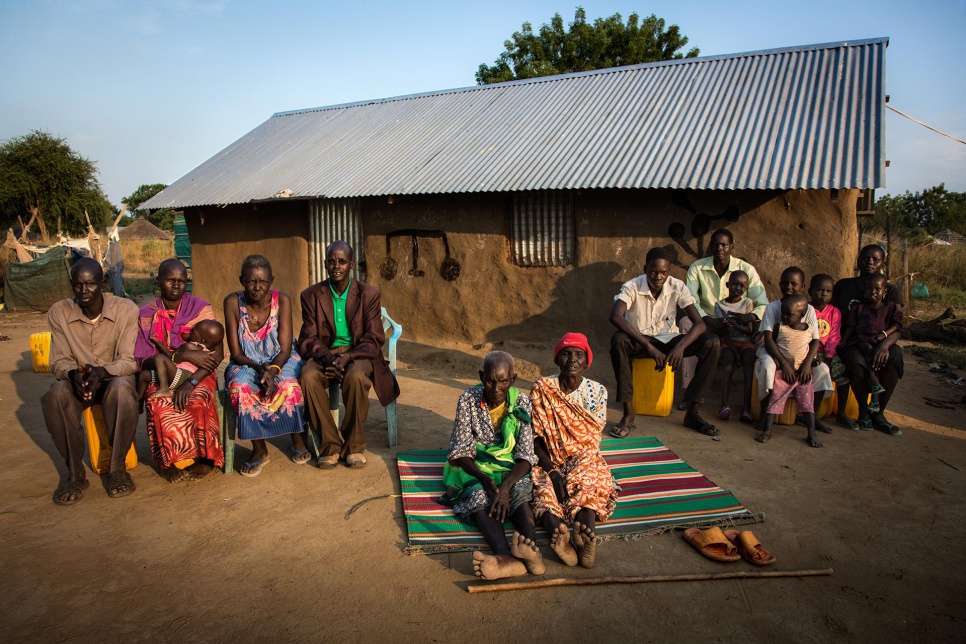
Three generations of the Deng family – including Ayuel Deng, 43, and his wife, Akuang (far left); Adau Mabior, lxxx (centre with carmine hat); and Athieng, 9 (4th from right) – sit down in front of their accommodation in Bor, South Sudan. © UNHCR/Andrew McConnell
Ayuel Deng is prone to occasional outbursts – the effect, he says, of repeatedly fleeing from war. He first ran with his parents and brothers when he was 12, when bombs vicious from airplanes that roared to a higher place his village on an otherwise normal day.
"We ran quickly, carrying nothing," he recalls. "Maybe y'all don't understand: we ran in what nosotros wearing at that moment, I didn't know that I would not return for 10 years." Walking for weeks, surviving on wild melons and pumpkins, leaving starving friends behind on the path, he reached condom in Ethiopia, then Kenya, before slowly making his way domicile and finally reaching his village equally a young man of 22. His mother was in that location, alive and well. His father had died in the fighting.
"I was then happy, then instantly so sad," says Ayuel, now 43. At least the war had moved on. He worked to enhance a dowry for a wife, something his father would have paid, but his father was gone. Eventually, in 2005, the year of the peace bargain, he married Akuang. Together, they now have 5 children, anile 2 to nine.
"Nosotros never expected there to be war over again after the peace deal, considering if those old enemies were at peace, where would war come from?" he asks. "Merely then we had to run again. It was the same: armed men coming to the village, and us running to the remote areas. Now, every bit a grown man, I was running once again with merely the clothes on my back, and eating the same wild fruits I ate when I walked to Ethiopia as a child."
Ayuel'due south children witnessed the fighting, and saw neighbours being killed. "This has an touch on," he says. "It had an touch on on me when I was immature, because I have sudden aggression that is unreasonable, because of that war. The same thing will happen to my children."

Athieng Ayuel, nine, stands near her family's temporary home in Bor, South Sudan. © UNHCR/Andrew McConnell
Athieng, Ayuel'southward nine-twelvemonth-old daughter, remembers the sound of the guns. "They were and so loud, like they were right behind me and the bullets were going to hit me," she says. The worst part of fleeing, she says, is being scattered from her friends. "I don't know if I will encounter them again."
This was the 3rd fourth dimension that Adau Mabior, Athieng's grandmother, who estimates she is 80 years old, has had to abscond fighting. "Tell the earth, if they accept some powerful means to stop this war, and guarantee the security in my hamlet, then finally I can get there and rest," she says. "Without that guarantee, I volition not render. It is non safe. I know that."
Ayak Lual's Family
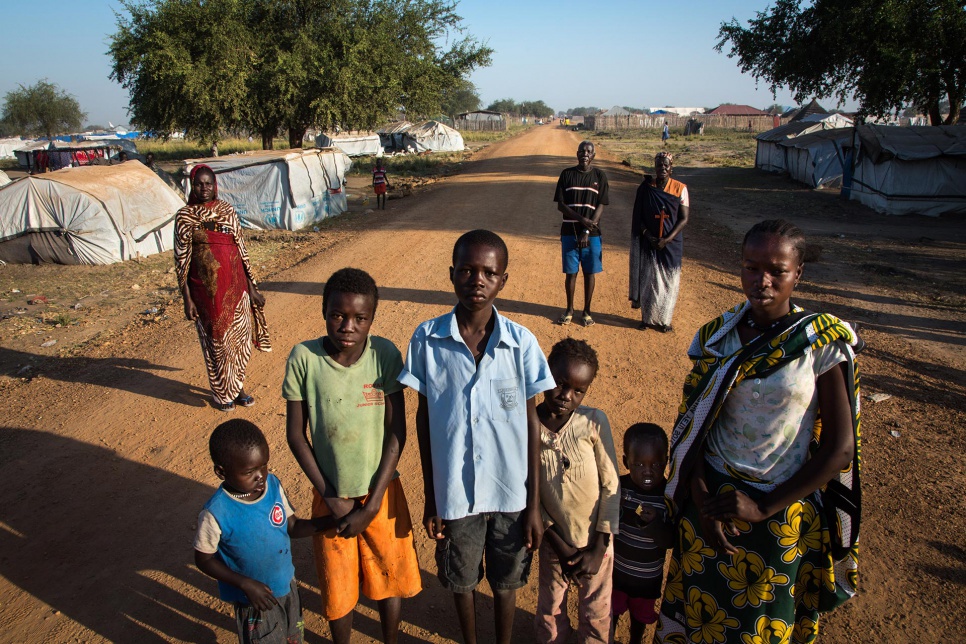
Ayak Lual (left) stands virtually her vi children, ages 2 to 19, and her father, Lual, 65 (in bluish shorts), on the road running through Mingkaman, South Sudan. © UNHCR/Andrew McConnell
Ayak Lual, 33, comes from a big family. She has six children, with another due in December, and her father married twice, meaning she has more than a dozen siblings and footstep-siblings. Nevertheless, for much of her life, she has felt alone and on the run, as she is now after fighting erupted near her home a twelvemonth ago.
"From when I was virtually six, we were away from our home because of that second Sudan war," Ayak says. "And then my mother was captured past soldiers and it was 10 years before I saw her once again. I was left running from boondocks to boondocks only with one brother and my father. Eventually, my blood brother fell sick and died, and my father and I were the merely ones remaining. This is what happens when you are scattered by war."
Her begetter, Lual Arok, remembers a similarly solitary existence as a fellow, after fleeing home to escape the first Sudanese civil war – and an abusive uncle with whom he lived after his parents died. "I was moving all the time, from one place to the other, with no thoughts of home," he says. "It's only when you are older you think of the importance of beingness in your own identify."
Only for now, neither he nor Ayak nor their extended family unit members are "in their ain place." Both alive in stick-and-tarpaulin shelters in a temporary settlement for displaced people. For Lual it's a struggle. He is getting older, and his second wife was shot and killed during the fighting earlier this year, leaving him to care for their five children, the eldest only 15. "I thought these times of state of war and suffering were past, but they are not," he says.

Ayak Lual, 33, pictured with her son, Adoor, 12, and daughter, Akon, eight, at their temporary habitation in Mingkaman, South Sudan. © UNHCR/Andrew McConnell
For Ayak, being chased from her abode again means her dreams are on agree. "I had a business concern selling tea in the market, but I cannot do that hither," she says. "Nothing hither earns money, nosotros alive only by what the Un gives us. When we had peace after that long 22 years of war and struggle, I never thought we would accept to go into exile again."
She hopes the wheel of displacement volition stop with her children's generation.
So does Adoor Akoi, Ayak's 12-year-sometime son. "I remember the gunshots, people running to where we were, having to run away, getting the boat here," he says. He refuses to admit to being agape. "You were, it's okay," his mother tells him quietly.
What bothers Adoor nearly are simple things: they sleep on mats on the floor, not mattresses on beds. Schoolhouse is more crowded. His friends are scattered. What bothers his grandpa, Lual, and his mother, Ayak, are the hidden scars from the war that are yet to heal inside him, or in his brothers and sisters.
Awan Deng's Family
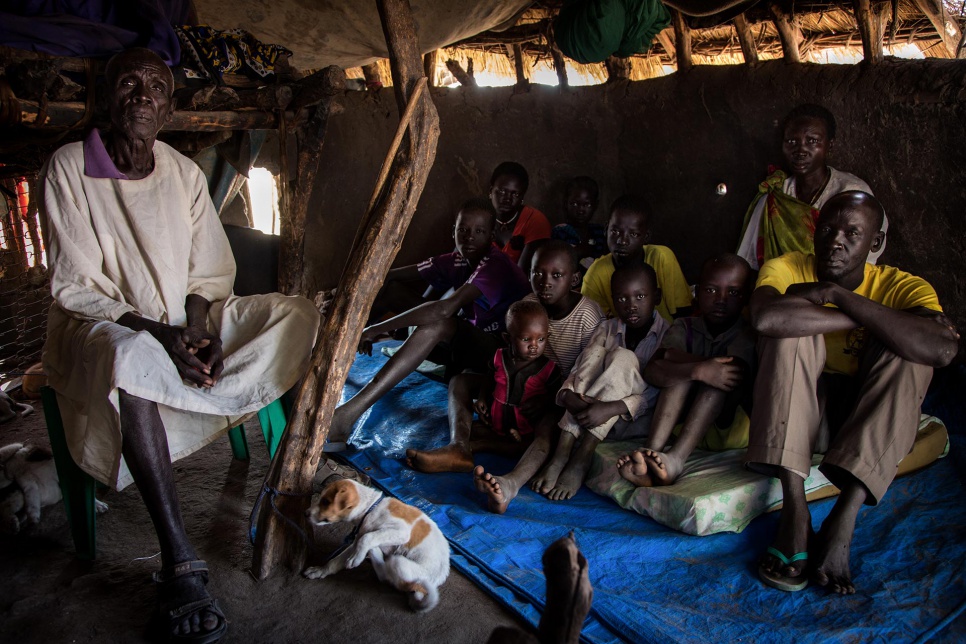
Awan Deng, 87, (left) pictured with his son, Joseph Majak, 43 (right) and Joseph's wife, Aweng, and their eight children, in an abandoned hut in Mingkaman, South Sudan. © UNHCR/Andrew McConnell
When South Sudan won independence from Sudan, Awan Deng thought that finally something adept had come of all the fighting. But now, defenseless upward in his third war at age 87, he is living in someone else's abased hut and surviving on handouts after fleeing his home with his family amidst fresh conflict.
"We are none of united states of america involved in politics," he says, sitting on a reed mat in the shade. "It is simply those who wage the war and win the war who get the spoils of war. Those of united states innocents caught up in it, we only get starvation and killing and our property looted or destroyed, just and then we can be given new leaders who change nothing."
He first fled home when he was about thirty, and trying to care for his family's cows, which were all lost. Then "a worse war" came, when he remembers running with his son, Joseph Majak, now 43 but then a teenager. Now father and son are living together with Joseph's children, Awan's grandchildren, in a settlement for people displaced by the latest conflict.
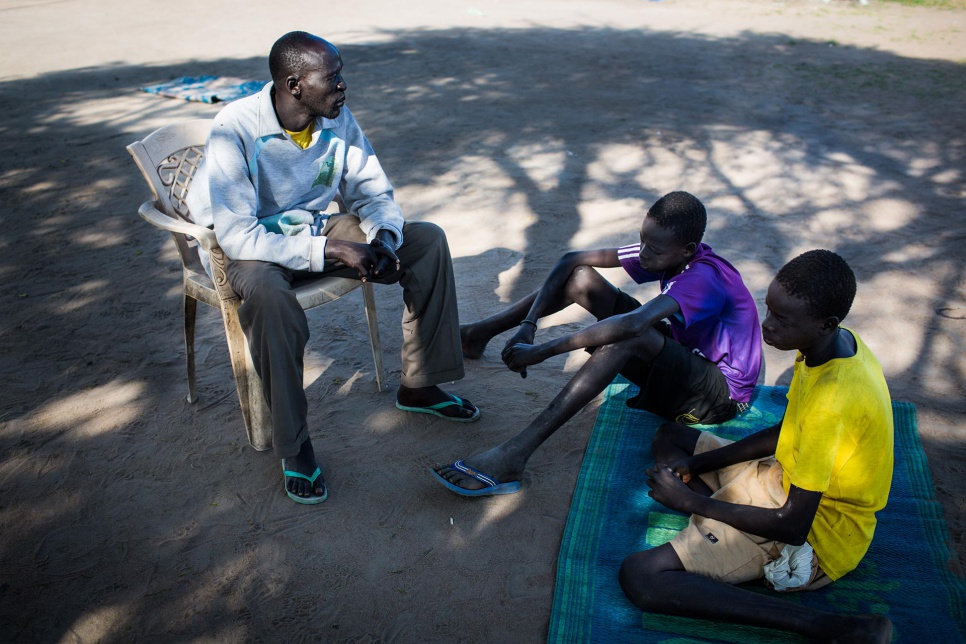
Joseph Majak, 43, sits with his twin sons, Aluong Majak and Ngor Majak, 15, in Mingkaman, South Sudan. © UNHCR/Andrew McConnell
Joseph's family fled to the settlement for displaced people in Mingkaman later fighting broke out between government troops and anti-regime rebels in Dec 2013. "We thought that this ane would not touch the states," says Joseph. "But information technology persisted and we had to run, nosotros even went to the aforementioned woods surface area that nosotros ran to in the 1980s, and where my male parent ran in the 1960s."
They survived on the same wild fruits, and taught the latest generation how to make a bed in grass beneath trees, and how to strain dirty water. "My children saw that fighting, they saw killing on the streets," Joseph says. "Some are very young. Nosotros lay downwards behind a wall to avert bullets, and they said, 'Daddy, don't go out us. Daddy, you won't leave us will y'all?' This is their life."
He refuses for now to bow to his children's demands that they return home. He tells them it'south nevertheless non condom. "In reality, I don't desire to go back to town because my eldest boys, they are 15, they would be recruited to fight and go child soldiers," he says. "I don't tell them but that's why nosotros are not going dwelling house."
Those boys, Aluong and Ngor, say they'd rather be back dwelling house. "Here there'south nothing to practice, we're not with our friends, it's boring," Ngor says. Asked if he remembers the fighting, he says, "of class, the guns." Asked if he wants to join the fighting, he says, "not really", but his expression and the quick glance he gave his twin brother suggested otherwise.
Deng Awuol's Family
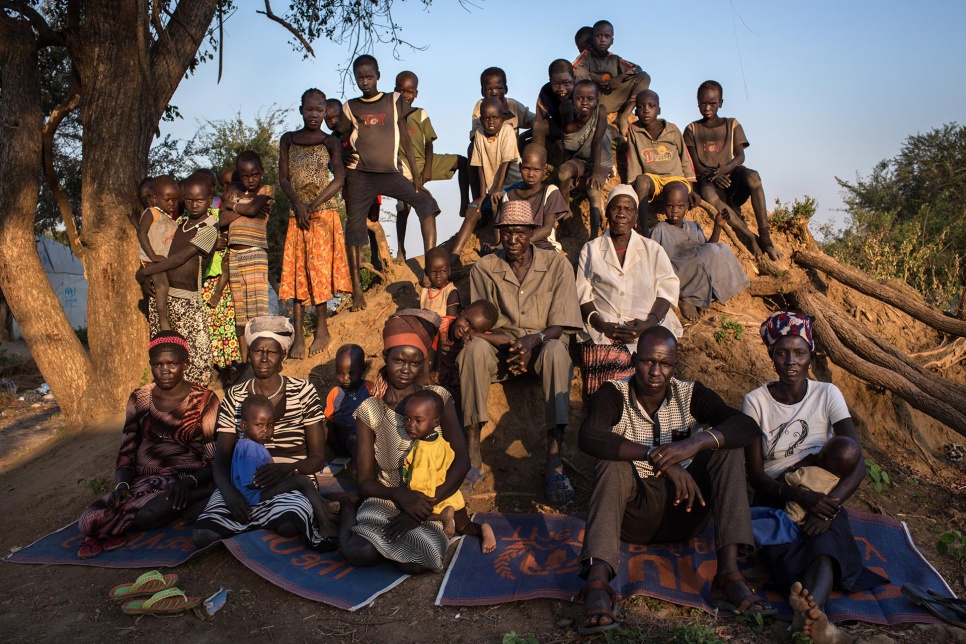
Deng Awuol (eye), 76, pictured with his married woman, Nycot, 68, and son Awuol Deng, 28 (second from right) and his wife, and three of his daughters and over twenty of his grandchildren, near their tented shelters in Mingkaman, Southward Sudan. © UNHCR/Andrew McConnell
Deng Awuol, 76, knows all about the dangers of fleeing from fighting, because this is third fourth dimension in his life he has had to do it. He knows nigh the soldiers and the bullets, and the lack of food and the difficulty finding condom hiding spaces. When disharmonize once more erupted in December 2013, he likewise knew to catch a large tarpaulin as he ran with his family – his son Awuol Deng, 28, his second wife, and his children and grandchildren. Together, they were a group of more than 30 people, many of them young children who could not swim.
"I know now that the greatest danger is drowning, considering the safest identify is deep in the creeks and islands of the river," he said. "So nosotros carried that tarpaulin and then nosotros adults held the edges tight and the children rode on top over the h2o like a raft. Too many times earlier I saw children die from drowning. We have learned amend ways."
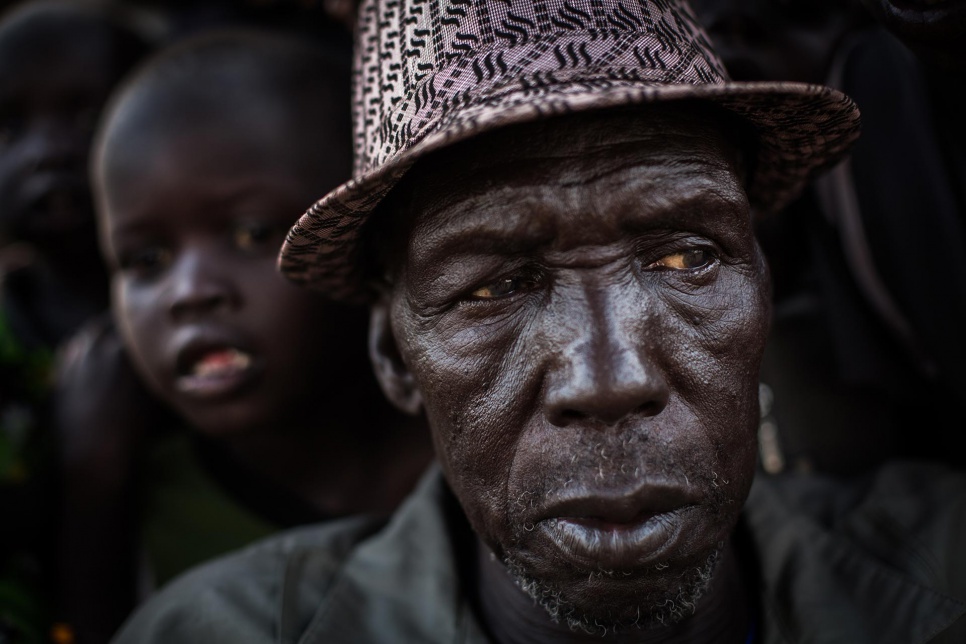
Deng Awuol, 76, pictured with his grandchildren in Mingkaman, South Sudan. © UNHCR/Andrew McConnell
Deng has fled his home three times: during the first Sudanese civil war, effectually 1969; once again, with Awuol, during the second Sudanese civil war; and now once more. Awuol remembers long, damp months hiding in the wood before returning home. "Finally when we got back, our hamlet looked like the wild bush, the grasses and trees had grown everywhere, nosotros had to kickoff all over over again," he says. "Information technology took a long fourth dimension and at present it's all destroyed over again."
They know they will accept to practice the same all over over again when they finally feel it is safe to go domicile. "We actually want to become," Awuol says, "because being in a place that is non your own is not proficient. Yous have no one to support you in disputes, because this is not your place, it'southward theirs. You first to adopt the ways of this foreign environment, instead of staying true to your own culture."
Deng, his male parent, nods in understanding. "Any crisis like this too makes u.s. dependents," he says. "Nosotros're not supposed to be like that, when there's no crunch, we don't need that assist. The children, all they will know is that things like nutrient, or even buckets or mats, are given gratis, and they will grow up without existence able to depend on themselves." That worries him, he says, specially every bit he refuses to hope that his grandchildren will be the last generation of his family unit to have to abscond fighting. "This cycle volition repeat, you cannot tell me information technology won't," he says.
Deng Thon'due south Family
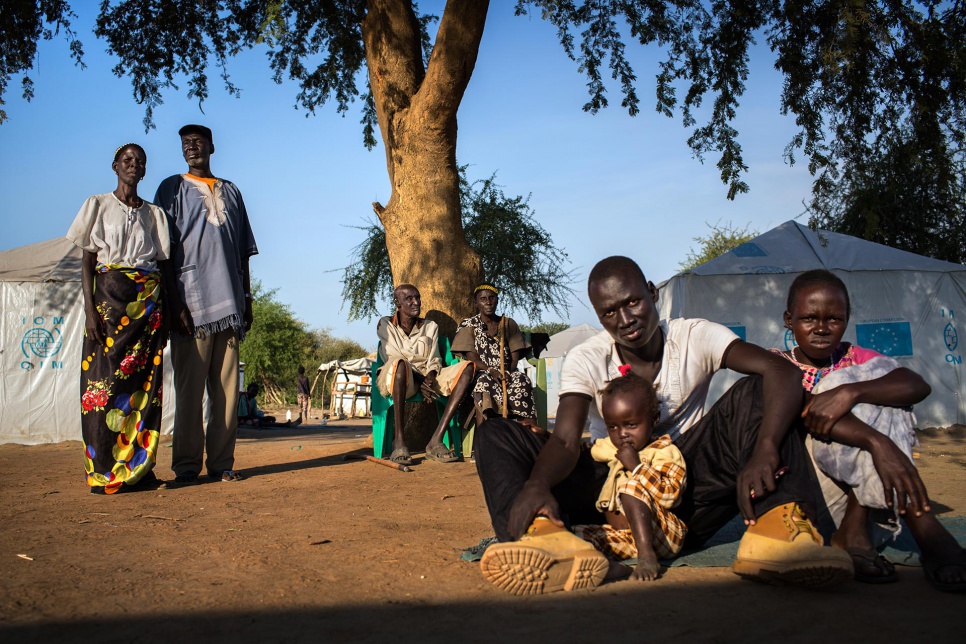
From left to right, Agot Deng and husband Deng Thon, 57; Deng's father and mother, Thon Malual, 84, and Adau Yool, 79; and Deng'southward son, Ruben Ajang Deng, 35, and daughter, Amer Deng, 22, and Ruben'southward daughter, Abul Ajang, ii â€" exterior their shelters in Mingkaman, Due south Sudan. © UNHCR/Andrew McConnell
When asked what he really needs to make life easier for his family in this temporary settlement for people displaced by state of war, Deng Thon, 57, lists better food, medicines, fresh milk for the children, things everyone here says they require. But start, earlier all that, he says he needs "a good chair for my Dad." Deng's father, Thon Malual, is 84, and fading. Most of the day he sits with his skin-and-bones frame folded crookedly into a hard plastic chair.
"I know a carpenter who tin can make a nice comfortable chair, only he needs money and when you left your money and your cows and your possessions behind because when you ran, all you could carry was your children, how can you lot pay a carpenter?" Deng asks, exasperated. "What son can be satisfied if, as a grown homo, he cannot even provide his father with somewhere comfortable to sit down downwardly?"
It is the lack of independence and an inability to work and earn a wage that is getting to Deng now. He has already lived through losing 13 of his children from three wives, who all died when they ran from the second Sudanese civil war, eventually catastrophe up first in Ethiopia, and so Republic of kenya.
Fifty-fifty before that, his mother, Adau Yool, remembers fleeing fighting in the showtime war. "When this thing started in December, information technology just straight away reminded me of that outset time, even though it was nearly 50 years ago," Adau, 79, says. "At present I am a corking-grandmother, only I knew where to escape to because it was the same place we went when I was just a immature mother."
With the memories of the children he lost during the last state of war haunting his thoughts, Deng'south major worry at present is losing another generation. "Ringing in my heed was the fearfulness that the hunger and affliction will come up back and take my grandchildren the fashion it took my children." Hearing this, his son, Ruben Ajang, cradled his two-yr-onetime girl – Deng'south grandchild – closer.
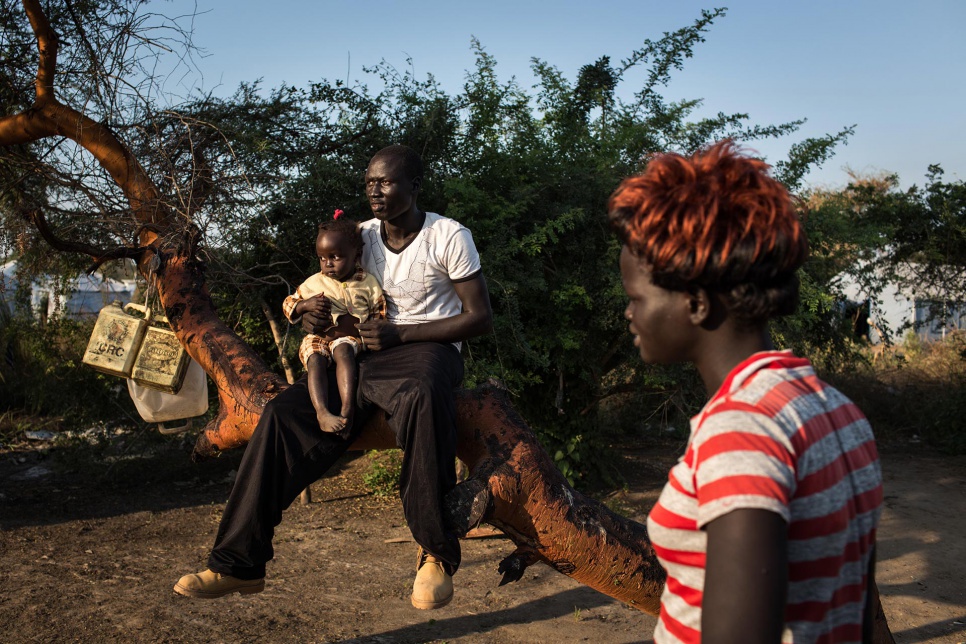
Ruben Ajang Deng, 35, sits with his daughter, Abul Ajang, two, exterior their temporary shelter in Mingkaman, South Sudan. © UNHCR/Andrew McConnell
Ruben, 35, was forced to flee with his wife, daughter and extended family members after fighting broke out in December 2013. Recalling that time, Ruben says, "In December last yr gunmen were all around, shooting people and killing people, even neighbours. I witnessed it. A mother and her husband, they were stopped and so shot at that place. I saw them fall down. I had to make everyone who had survived run or the same affair would happen to u.s.."
Looking at his young girl, he continues: "She is young, only she cannot forget the noise of the fighting, the way I remember the racket of the starting time fighting I experienced when I was a immature male child. I don't know how this volition end. We seek only peace and to exist i united nation, and for families never to take to run abroad again."
At that, his father and his grandmother sigh in unison. Hope felt in short supply.
Ayen Majak's Family
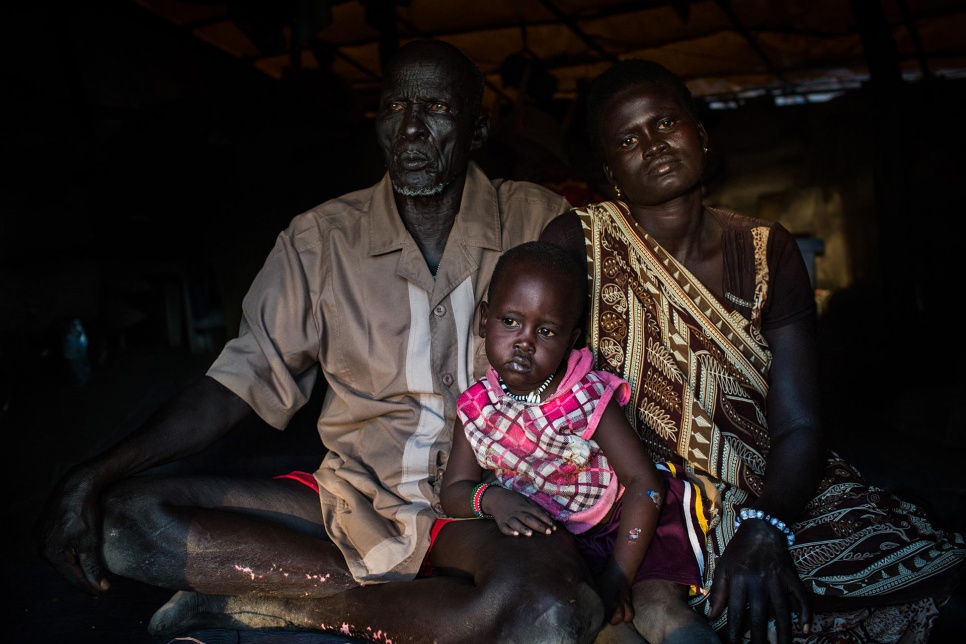
Majak Akoi, 75, his daughter Ayen Majak, 25, and Ayen's daughter Ajak Chol, ii, pictured in their temporary accommodation in Mingkaman, South Sudan. © UNHCR/Andrew McConnell
During the rains a few months ago, a brief volley of gunfire erupted a mile or so from where Ayen Majak settled for safety with her five-year-one-time son, Thon, and daughter Ajak, who is two. The children were terrified. "They said to me, 'The men with guns are coming again, aren't they? Nosotros will have to run once again, won't nosotros?' " Ayen says. "I tried to tell them it was nothing, but they were so frightened they did not eat for 2 days."
Ayen and her father, Majak, who came hither to Mingkaman after fighting erupted again in South Sudan in December 2013, recognised that fright. "I was near eighteen the first time I had to run away from habitation because of fighting, in that first war," says Majak, now 75. "I was a swain. My father said the enemy would recall I was a soldier, or the rebels would kidnap me to be i. It was amend I lived hiding in the wood for some years."
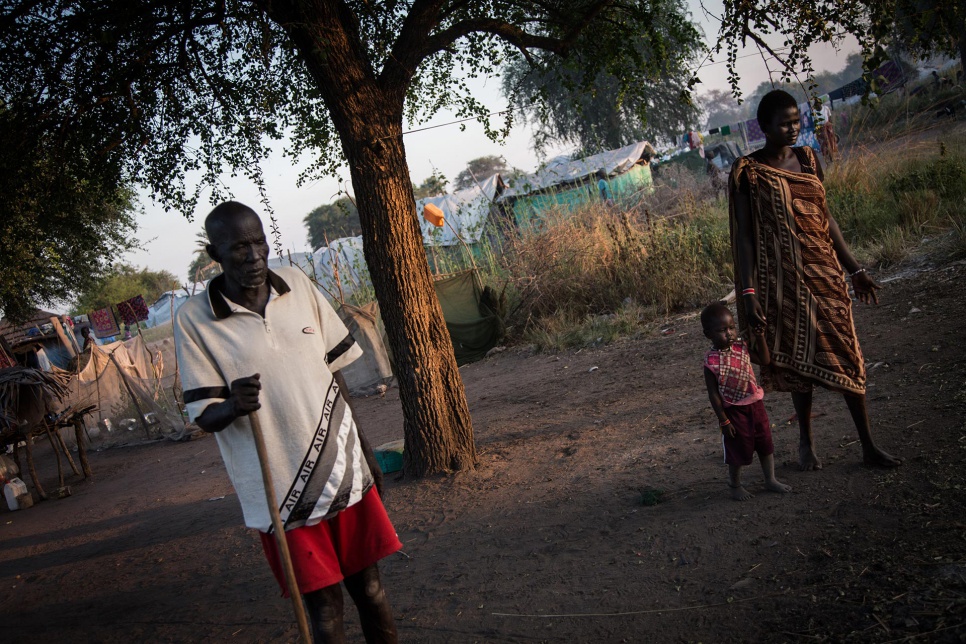
Majak Akoi, 75, his daughter Ayen Majak, 25, and Ayen's daughter Ajak Chol, two, pictured outside their temporary accommodation in Mingkaman, South Sudan. © UNHCR/Andrew McConnell
When she ran from fighting in the 2nd Sudanese civil war, as a girl of seven alone with her v-year-onetime brother, Ayen spent 10 terrifying days in the same forest that her male parent had hidden in a generation earlier. "I didn't know all the local fruits, I didn't know what we could swallow," she remembers. "Nosotros almost died." When they were constitute and reunited with Majak, they however faced another v years on the run earlier it was safe enough to render dwelling, where they stayed raising livestock in peace for close to two decades.
But so the current conflict broke out, and the family unit had to run again. "Information technology was such a surprise to us," Majak says. "To see fighting and killing again. Those killings, they added to the ones I saw in the other wars, and I tell you, when I slumber those people are killed over and over over again in my dreams. I can merely recollect of those bad things."
Ayen worries well-nigh him. She worries virtually her children, likewise, and fifty-fifty their children, the next generation to come. "This fleeing happened to us when my father was a child, and to me when I was a kid, and to my children now they are children," she says. "How can y'all tell me honestly information technology will non besides happen when they take their ain children?"
Share on Facebook Share on Twitter
weathersficip1989.blogspot.com
Source: https://www.unhcr.org/news/stories/2014/12/56ec1e7b22/escaping-war-time-and-again.html
0 Response to "Peace Escapes Once Again"
Post a Comment